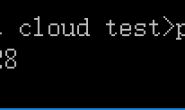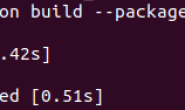python常用列表,数组操作范例
# experimenting with Python's list
# tested with Python23 vegaseat 21feb2005
# import module os for method listdir()
import os
# creat an empty list (list object pointed to by iL)
iL = []
print "\nThese are the attributes and methods of a list:"
print dir(iL)
print "\nA list of America's Most Popular Lawyers:"
print iL
print "\nLoad the list with 0 to 9"
for number in range(10):
iL.append(number)
print "\nShow the loaded list:"
print iL
print "\nSame but simpler:"
iL2 = range(10)
print iL2
print "\nThere are %d elements, min = %d, max = %d" % (len(iL), min(iL), max(iL))
print "\nShow the first element (lists are zero based):"
print iL[0]
print "\nShow the final element:"
print iL[-1]
print "\nSum up all the integers in the list:"
print sum(iL)
# this is called slicing
# [starting-at-index : but-less-than-index [ : step]]
# start defaults to 0, end to len(sequence), step to 1
print "\nShow the first 3 elements:"
print iL[:3]
print "\nShow every second element starting with index 1:"
print iL[1::2]
# cloning, assign one list to another list from start to end
iL2 = iL[:]
# aliasing is simpler, but iL3 retains the address of iL
# so if you change iL you also change iL3, oops!!!
iL3 = iL
print "\nList assigned to another list:"
print "original", iL, "id =", id(iL)
print "clone ", iL2, "id =", id(iL2)
print "alias ", iL3, "id =", id(iL3)
# search the list for integer 7
print "\nValue 7 is at index = %d\n" % iL.index(7)
# insert an element
print "Insert another 7 at that index:"
iL.insert(iL.index(7),7)
print iL
print
# check if there are two sevens
if iL.count(7) == 2 :
print "There are two sevens in the list"
elif iL.count(7) == 1 :
print "There is one seven in the list"
else:
print "There are %d sevens in the list" % iL.count(7)
print "\nRemove the extra 7 :"
if iL.count(7) > 1 :
iL.remove(7)
print iL
print "\nReverse the list:"
iL.reverse()
print iL
print "\nSort the list:"
iL.sort()
print iL
# insert a list
list1 = ['a', 'b', 'c', 'd', 'e']
print "\nOriginal list:"
print list1
print "Insert another list at index 3:"
list1.insert(3, ['n1', 'n2', 'n3'])
print list1 # ['a', 'b', 'c', ['n1', 'n2', 'n3'], 'd', 'e']
# using slicing to insert several elements into a list
# this inserts elements of ['n1', 'n2', 'n3'] at index 3:
list2 = ['a', 'b', 'c', 'd', 'e']
print "\nInsert elements of another list at index 3:"
list2[3:3] = ['n1', 'n2', 'n3']
print list2 # ['a', 'b', 'c', 'n1', 'n2', 'n3', 'd', 'e']
# using slicing to replace an element with other elements
# this replaces element at index 3 with elements of ['n1', 'n2', 'n3']:
list3 = ['a', 'b', 'c', 'd', 'e']
print "\nReplace element at index 3 with elements of another list:"
list3[3:4] = ['n1', 'n2', 'n3']
print list3 # ['a', 'b', 'c', 'n1', 'n2', 'n3', 'e']
# you can create a list of mixed types ...
mixedList = []
mixedList.append(1.23)
mixedList.append('a')
mixedList.append('mixed')
mixedList.append('type')
mixedList.append('list')
mixedList.append(77777)
mixedList.append(0xff) # hex turns to decimal
mixedList.append(355/113.0) # approximation of pi
print "\nA list of mixed types:"
print mixedList
print
# show the difference between two lists using zip() and list comprehension
list1 = [1, 2, 3, 4, 5, 6, 7, 8, 9, 10]
list2 = [1, 2, 3, 4, 4, 6, 7, 8, 9, 11]
print "list1 =", list1
print "list2 =", list2
print '-' * 60 # vanity line of dashes
print "These are the items different in the two lists:"
print [(x, y) for (x, y) in zip(list1, list2) if x != y]
# let's go from integers to strings ...
print "\nOriginal string:"
s = "I'm dreaming of a white precipitate"
print s
# create a list of strings
print "\nSeparate string at any whitespace to a list of words:"
sL = []
sL = s.split()
print sL
print "\nAdd 2 more words:"
sL.append("in")
sL.append("class")
print sL
# search the list for dreaming
print "\n'dreaming' is at index = %d\n" % sL.index('dreaming')
print "Insert an item at index 1 (moves rest of elements up):"
sL.insert( 1, "merrily")
print sL
print "\nInsert an item one index in from the end:"
sL.insert( -1, "chemistry")
print sL
print "\nPrint the list one item on a line:"
# new line as delimiter
print "\n".join(sL)
print "\nJoin the list of words to form a string again:"
# single space = " " as a delimiter
s2 = " ".join(sL)
print s2
print "\nRemove 'white' from the list:"
sL.remove('white')
print sL
# treat this list like a stack (last in first out)
# like a stack of dinner plates
print "\nOperate the present list like a stack (LIFO):"
print "pop last element = " + sL.pop()
print "pop second last = " + sL.pop()
print "pop third last = " + sL.pop()
print "this is left:"
print sL
print
# treat this list like a queue (first in first out)
# like the line at the store check-out
print "Operate the present list like a queue (FIFO):"
print "pop first element = " + sL.pop(0)
print "pop second element = " + sL.pop(0)
print "this is left:"
print sL
print "\nSort this list:"
sL.sort()
print sL
print "\nIs 'of' in this list?"
if 'of' in sL:
print 'yes'
# let's look at sorting a list of strings
str = "I really love Monty Python's Flying Circus"
wordList = []
wordList = str.split()
print "\nThe original list of words:"
print wordList
print "\nSort this list (the default sort is case sensitive):"
wordList.sort()
print wordList
# use anonymous function lambda to do a case insensitive sort
# in this example compare as all lower case strings
# (somewhat inefficient but sweet for short lists)
print "\nHere is a sort that is case insensitive:"
import string
wordList.sort(lambda x, y: cmp(string.lower(x), string.lower(y)))
print wordList
print
# a way to weed out duplicate words from a list
rawList = ['just', 'a', 'test', 'a', 'test', 'of', 'an', 'ordinary', 'string']
# create an empty list
uniqueList = []
# use a list comprehension statement (takes a while to understand)
[uniqueList.append(wrd) for wrd in rawList if not uniqueList.count(wrd)]
print "The raw list containing duplicates:"
print rawList
print "The unique list (no duplicates):"
print uniqueList
# find all the .bmp files in the Windows folder
print "\nAdd all the bitmap files in the Windows folder to a list:"
path = 'c:/windows/'
ext = '.bmp'
# create an empty list
fileList = []
for filename in os.listdir(path):
if filename.endswith(ext):
fileList.append(filename)
# show the list of files
print fileList
print "\nShow one filename on each line:"
for filename in fileList:
print filename




